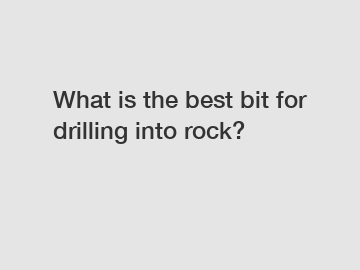What is the best bit for drilling into rock?
What is the best bit for drilling into rock?
When it comes to drilling into rock, finding the right bit is crucial. Rock drilling requires a specialized tool that can withstand the hardness and abrasive nature of rocks. With a plethora of options available in the market, it can be challenging to determine which bit is the best for the job. In this article, we will explore the various types of rock drilling bits and discuss their strengths and limitations.
1. Carbide Masonry Drill Bits:

Carbide masonry drill bits are commonly used for drilling into rocks. These bits feature a specialized carbide tip that is designed to withstand the extreme hardness of rocks. Carbide is known for its durability and can handle the high impact and heat generated during drilling. The sharp cutting edges of these bits allow for efficient drilling, making them a popular choice among professionals. However, while carbide masonry drill bits work well for softer rocks, they may struggle with extremely hard and dense rocks.
2. Diamond Drill Bits:
Diamond drill bits are known for their exceptional hardness and durability. As the name suggests, these bits have diamond-impregnated tips that make them ideal for drilling into very hard rocks. The diamond particles on the tip grind through the rock, creating an efficient drilling process. Diamond drill bits are widely used in the mining and construction industries due to their ability to handle extremely hard materials. While diamond bits are highly effective, they tend to be more expensive than other options.
3. Titanium-Coated Drill Bits:
Titanium-coated drill bits are a popular choice for drilling into various materials, including rock. These bits are made of high-speed steel with a titanium nitride coating, which provides increased durability and heat resistance. Titanium coating reduces friction during drilling, allowing for faster and smoother drilling into rock. However, while titanium-coated bits can handle softer rocks effectively, they may struggle with extremely hard and abrasive rocks.
4. Twist Drill Bits:
Twist drill bits are commonly used for drilling in various materials, including rock. These bits have a spiral-shaped cutting edge that helps to remove debris and facilitate drilling. While twist drill bits are versatile, they are not specifically designed for drilling into rock. They may work well for softer rocks but can wear out quickly when used on harder rocks. Therefore, twist drill bits are best suited for light-duty drilling applications in rocks.
In conclusion, determining the best bit for drilling into rock depends on the specific requirements of the task at hand. Carbide masonry drill bits are durable and efficient for softer rocks, while diamond drill bits excel in drilling extremely hard rocks. Titanium-coated drill bits offer a balance between cost and performance, making them suitable for a wide range of rock types. Twist drill bits, on the other hand, may be sufficient for light-duty drilling in softer rocks. It is crucial to assess the hardness, density, and abrasive nature of the rock before selecting the appropriate bit. By choosing the right bit, you can ensure a successful drilling operation and achieve the desired results.
For more information, please visit auger core barrel, Tri Cone Rock Bit, PDC Oil Drill Bit.

Comments
0